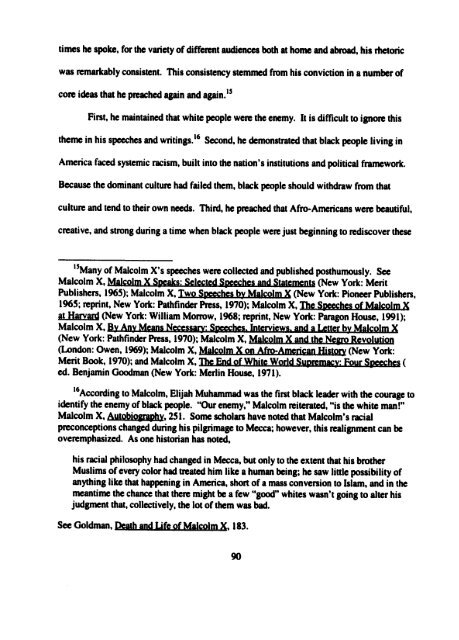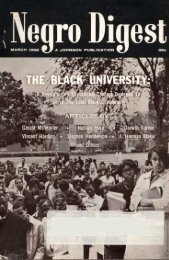3. Strain, Christopher Barry. “Civil Rights and ... - Freedom Archives
3. Strain, Christopher Barry. “Civil Rights and ... - Freedom Archives
3. Strain, Christopher Barry. “Civil Rights and ... - Freedom Archives
You also want an ePaper? Increase the reach of your titles
YUMPU automatically turns print PDFs into web optimized ePapers that Google loves.
times he spoke, for the variety of different audiences both at home <strong>and</strong> abroad, his rhetoric<br />
was remarkably consistent . This consistency stemmed from his conviction in a number of<br />
core ideas that he preached again <strong>and</strong> again .~ s<br />
First, he maintained that white people were the enemy . It is difi"icult to ignore this<br />
theme in his speeches <strong>and</strong> writings .~ 6 Saond, he demonstrated that black people living in<br />
America faced systemic racism, built into the nation's institutions <strong>and</strong> political framework .<br />
Because the dominant culture had failed them, black people should withdraw from that<br />
culture <strong>and</strong> tend to their own needs. Third, he preached that Afro-Americans were beautiful,<br />
creative, <strong>and</strong> strong during a time when black people were just beginning to rediscover these<br />
~SMany of Malcolm X's speeches were collected <strong>and</strong> published posthumously . See<br />
Malcolm X, Malcolm X SQeaks : Selected S~seches <strong>and</strong> Statements (New York : Merit<br />
Publishers, 1965) ; Malcolm X, Two Speeches by Malcolm X (New York : Pioneer Publishers,<br />
1965 ; reprint, New York: Pathfinder Press, 1970) ; Malcolm X, The Speeches of Malcolm X<br />
at Harvard (New York : William Morrow, 1968 ; reprint, New York : Paragon House, 1991) ;<br />
Malcolm X, BA_ny Means Necessary Speeches :<br />
. Interviews . <strong>and</strong> a Letter by Malcolm X<br />
(New York : Pathfinder Press, 1970); Malcolm X, Malcolm X <strong>and</strong> the Negi+o Revolution<br />
(London : Owen, 1969) ; Malcolm X, Malcolm X on Afro-American History (New York:<br />
Merit Book, 1970); <strong>and</strong> Malcolm X, The End of White World Supremacy: FourS~hes<br />
ed . Benjamin Goodman (New York : Merlin House, 1971).<br />
~6According to Malcolm, Elijah Muhammad was the first black leader with the courage to<br />
identify the enemy of black people. "Our enemy;' Malcolm reiterated, "is the white man!"<br />
Malcolm X, Autobioaraphv, 251 . Some scholars have noted that Malcolm's racial<br />
preconceptions changed during his pilgrimage to Mecca; however, this realignment can be<br />
overemphasized . As one historian has noted,<br />
his racial philosophy had changed in Mecca, but only to the extent that his brother<br />
Muslims of every color had treated him like a human being; he saw little possibility of<br />
anything like that happening in America, short of a mass conversion to Islam, <strong>and</strong> in the<br />
meantime the chance that there might be a few "good" whites wasn't going to alter his<br />
judgment that, collectively, the lot of them was bad.<br />
See Goodman, beach <strong>and</strong> Life of Malcolm X, 183 .
















